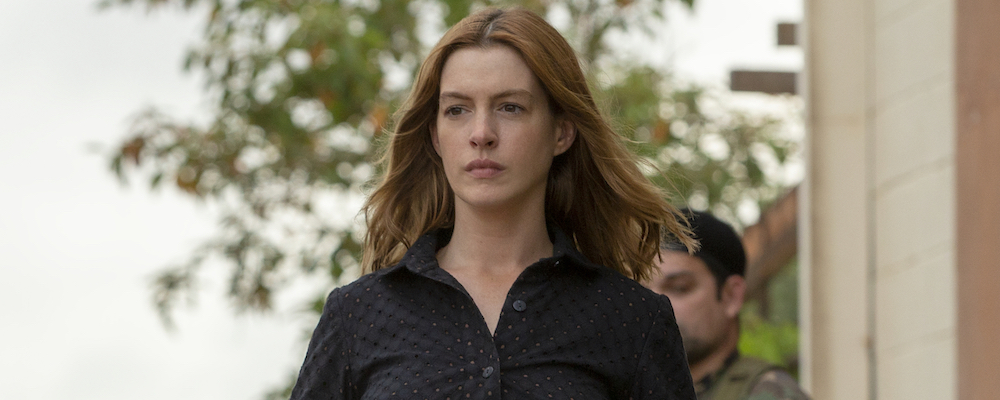‘The Last Thing He Wanted’ Turns Joan Didion Novel Into a Confusing Thriller About U.S. Gun Running in 1980s Central America
Alci Rengifo
Netflix’s “The Last Thing He Wanted” is both a missed opportunity and a curious example of what happens when a movie starts off about something clear then becomes incomprehensible. It’s based on a Joan Didion novel of the same name taken from the period when the great writer was absorbed by the civil wars raging in Central America and covert U.S. involvement. The civil war in El Salvador, the Sandinista Revolution in Nicaragua, and how they obsessed the Reagan White House are worthy subjects for a movie, especially since it’s all disappeared from our national discourse. Too bad this film is both heavy on cryptic discourse while lacking any coherent order.
We meet Atlantic Post reporter Elena McMahon (Anne Hathaway) as she treks through the Salvadoran jungle with guerrillas of the Farabundo Marti National Liberation Front (FMLN). Along with photographer Alma (Rosie Perez), Elena makes enemies in Washington by reporting on the brutal civil war in the small Central American nation and how the U.S. weapons smuggling channels are linked. She’s soon taken out of El Salvador and sent to cover the 1984 U.S. presidential elections, which of course bores her to death. Then her father Richard (Willem Dafoe) appears, visibly unwell. But Elena soon discovers Richard is somehow linked to weapons smuggling down south. When he falls ill and goes to the hospital, Elena fills in for Richard and travels down to Costa Rica to follow the trail of a weapons black market involving both U.S.-backed regimes and rebel forces, even the Sandinista government in Nicaragua. As Elena digs deeper she gets close to a CIA official, Treat Morrison (Ben Affleck), who might be able to protect her. She also comes across a gallery of shady underworld figures willing to kill anyone threatening to expose their gun-running business.
“The Last Thing He Wanted” is easy to follow up until the moment Richard checks into the hospital and Elena makes her way down to Central America. It is then that director Dee Rees loses grasp of the material. It’s a surprising turn considering Rees’s previous film was the assured, absorbing “Mudbound,” about racial tensions in the World War II-era south. Here she falls into a classic trap where an American film about Latin America is just about the Americans. Except for a few scenes at the beginning, the Salvadoran civil war and Nicaraguan revolution become mere background scenery and footnotes. Elena becomes the prime focus but what she does and where is always blurred. There’s a lot of dialogue about corruption, weapons in exchange for money and the idea that corrupt forces in the U.S. are involved in foreign wars. But it’s all hinted at without clear explanations. It’s easy to lose track of where Elena even lands, it doesn’t help that in the novel itself the main Caribbean island where the plot climaxes is unnamed. Maybe Rees should have chosen another Didion book like “Salvador,” about the writer’s days living in the country witnessing the war and its various actors, or “A Book of Common Prayer,” another Didion novel about Central America with a much less archaic narrative. Even when these actual events were taking place in the 80’s, directors like Oliver Stone and Roger Spottiswoode made strong, easy to follow political thrillers inspired by the headlines.
Adding a strange tinge to the movie are the performances. These are accomplished names in the roster but everyone, whether Hathaway or Affleck, deliver their lines with an odd monotone style that feels like they’re speedily reciting memorized chunks of dialogue. It’s made worse by the disorienting nature of the editing. Nothing is given the space to build up. We learn little about Elena’s relationship with her father, except that the death of his wife, her mother, left a terrible void. At one point she sleeps with Affleck’s Morrison without any hint as to why, and this is followed by a specific, physical revelation about Elena that seems to have just been thrown in. Rosie Perez is kept around to sit by a desk the entire movie, waiting for Elena’s calls to recite updates on what she’s found. Toby Jones delivers the film’s best performance as a gay arms dealer in the Caribbean who boasts to Elena that he used to run the best gay bathhouses in Haiti. But exactly how he fits into the wider triangle of the plot Elena is uncovering is never properly revealed. We can assume this is all somehow tied to the Iran-Contra affair which dogged the Reagan presidency as a result of covert operations in Central America. But assuming isn’t enough because the movie simply never goes there.
And then Rees provides one of this later winter’s most abrupt, shockingly bad twist endings. It comes out of nowhere and tosses out to sea the whole point of having sat through the previous, nearly two hours of the movie. It’s a pity because rarely is the subject of the Salvadoran civil war and Nicaraguan revolution, events as important to U.S. policy in the ‘80s as Syria is today, explored in a U.S. movie. Nothing is learned about these conflicts and there’s no serious attempt at finding good fictional drama in them either. Joan Didion could take these subjects and turn them into riveting literature, but in “The Last Thing He Wanted” the movie version gets lost in translation.
“The Last Thing He Wanted” begins streaming Feb. 21 on Netflix.

